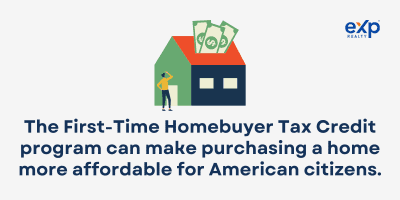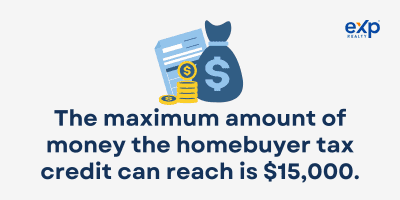Nearly two years ago, the U.S. federal government introduced the First-Time Homebuyer Act to revise the tax law. The particular law would allow for a first-time homebuyer tax credit of up to $15,000. That money would act as a refundable tax credit.
Essentially, the First-Time Homebuyer Act assists individuals with low-income or middle-income Americans to become first-time buyers and purchase a principal residence.
However, the First-Time Homebuyer Act has not become law as of yet. Yet, there are still other similar tax credit programs, such as a first-time buyer tax credit program. Essentially, first-time homebuyer federal tax credits are programs from the government that help people buy a home.
Overall, these credits help reduce the tax bill that new homeowners have to pay. Therefore, the tax credit programs incentivize more people to purchase their first homes and help them afford the actual purchase price of the home and other closing costs.
What Is the First-Time Homebuyer Tax Credit?

The federal first-time homebuyer tax credit became a general government program to assist home buyers after the 2008 financial crisis led to a downfall of the real estate market.
Essentially, such a homeowners’ tax credit program can make purchasing a home more affordable for American citizens. Specifically, these programs are meant solely for first-time homebuyers. However, the federal tax credits have run out and no longer exist. That is why the Biden first-time homebuyer tax credit was introduced via the First-Time Homebuyer Act in 2021.
Essentially, in April 2021, lawmakers introduced a refundable tax credit of up to $15,000. Yet, Congress has not passed the law as of February 2023.
This particular bill requires specific eligibility for those looking to benefit from the first-time homebuyer tax credit. The basic requirements include being a first-time home buyer and having certain income requirements. Essentially, those with a low or moderate income may have eligibility, as well as those with a lower credit score.
Their income cannot reach more than 60 percent higher than the median income of their region. Furthermore, eligible people cannot have used the tax credit before. It should be the first time they can claim it once the law passes. Essentially, those who claimed credits in 2022 cannot claim them again until 2027.
Those eligible for the tax credit cannot buy a property from a relative. These individuals also need to be at least 18 years of age.
How Much Is the Credit?

Under the First-Time Homebuyer Act that the administration of President Joe Biden is attempting to pass, the tax credit is up to 10 percent of a home buyer’s final purchase price. The maximum amount of money the homebuyer tax credit can reach is $15,000.
The main limitations of these tax credits include eligibility requirements and the income of the homeowners. Yet, the $15,000 first-time homebuyer tax credit is not the only option.
Many homeowners can also reduce their tax bill by using Mortgage Credit Certificates (MCCs). That tax credit can reach up to $2,000, but it depends on your interest rate and the location of your home.
How Do You Claim the Credit?
When lawmakers introduced the First-time Homebuyer Act in 2021, the language in the legislation did not specify exactly how to claim the credit. However, the wording is similar to the First-Time Homebuyer Credit of 2009.
The former legislation required an IRS form of taxes to go along with homeowners’ standard federal tax filing paperwork. Essentially, tax professionals expect that the new first-time homebuyer credit program will work mostly the same and require an additional IRS form.
Yet, there is one important difference between the 2009 First-Time Homebuyer Credit and the 2021 First-time Homebuyer Act. Essentially, the First-time Homebuyer Act allows homeowners to file an amended return for the previous year’s tax filing and obtain a cash payout right away from the federal government.
Other Important Considerations

The homeowners’ tax credit program under the First-Time Homebuyer Act of 2021 does not have any end date specified. The program does apply to any home bought on or after January 1, 2021. At this point, there are no specific deadlines for homeowners to claim the first-time home buyer tax credit.
A few other limitations of the first-time homebuyers tax credit program include repayment terms. Homeowners who will obtain the credit and then sell their property within four years or less will need to repay at least part of the tax credit.
For instance, a home buyer who sells a house within one year of buying it would owe 100 percent of taxes on the first-time homebuyer tax credit. When selling a property two years after purchase, the homeowners will need to pay back 75 percent of the credit.
Those who sold a house three years after buying it will need to pay taxes on 50 percent of the credit’s value. Lastly, if you sold your home four years after purchase, you will still need to pay 25 percent of the first-time homebuyer tax credit value.
Key Takeaways
The first-time homebuyer tax credit program can make a big impact on lowering your overall taxes after buying a new home. The 2008 financial crisis led to the homeowner tax credit program, which is now being revamped via the 2021 First-Time Homebuyer Act.
However, the legislation has not yet been passed into law. When it does become law, eligibility requirements will include the following:
- Reaching 18 years of age
- Buying property from a non-relative
- Having an income no larger than 60 percent higher than the median income in your neighborhood
- Filing for the tax credit for the first time
If you meet these eligibility requirements, you should consider applying for the First-Time Homebuyer Tax Credit. That way, you’ll have a much lower tax bill. You may save as much as $15,000 when the bill becomes law. For further assistance when looking into the first-time home buyer tax credit, ask your local real estate agent.
Frequently Asked Questions (FAQs)
Below, you can read detailed answers to the most common questions about the first-time homebuyer tax credit.
Is there a first-time homebuyer tax credit for 2023?
The First-Time Homebuyer Act introduced in 2021 has not been passed in Congress nor signed by President Joe Biden into law. As such, there is no federal first-time homebuyer tax credit for 2023 at this time.
For the federal bill to turn into law, Congress will need to reintroduce it since a new term has commenced in Congress. However, you may find a first-time homebuyer tax credit in 2023 on a state or local level. You may want to speak with a tax professional or accountant to learn about your local tax refund options.
How do tax credits work?
A tax credit is essentially a dollar-for-dollar decrease in taxes as compared to your income. For instance, if you owe $1,000 in taxes on your tax return but you have eligibility for a $1,000 tax credit, you can apply for the tax credit and avoid paying that $1,000.
There are different types of tax credits, like refundable ones and nonrefundable credits. A few federal tax credits include a foreign tax credit, a health coverage tax credit, and a low-income housing credit.
Do first-time home buyers get a bigger tax refund?
On a federal level, the Biden first-time homebuyer tax credit has not been passed into law in Congress nor signed into law by President Biden. As such, first-time home buyers do not get a bigger tax refund on a federal level right now. However, when the legislation does become law, first-time home buyers may get a tax refund as high as $15,000.
However, these first-time home buyers will need to meet specific requirements. For instance, these individuals cannot buy their first property from relatives and need to be at least 18 years of age.
What is the first-time home buyer tax credit?
The first-time home buyer tax credit is a financial incentive from the local, state, or federal governments to inspire more individuals to purchase their first houses, secondary homes, or a primary residence.
These tax credits simply reduce the tax amount you have to pay when filing your tax return every year. Let’s say that you owe $8,000 in taxes before the credit, and you got a first-time home buyer tax credit of $2,000. If that’s the case, you will then only owe only $6,000 in taxes.
What is an additional tax exemption for first-time homebuyers?
First-time home buyers may also have other tax exemptions to take advantage of, such as:
- Property tax deductions
- Tax deductions due to mortgage loan interest values
- Mortgage insurance premium deductions
- Deductions for loan origination fees
Furthermore, you may qualify for specific tax credits due to mortgage credit certifications, IRA withdrawals, energy credits for a smart home, and Freddie Mac or Fannie Mae programs. Essentially, you’ll want to speak with a tax professional to find out all the possible ways you can decrease your tax liability after buying your first home.
Who qualifies as a first-time home buyer?
To receive the first-time homebuyer tax credit in the future, you will need to meet specific eligibility requirements. To become eligible, you need to:
- Buy a home for the first time
- Reach 18 years of age or older
- Purchase a home from a non-relative
- Have an income no larger than 60 percent of the median household income in your area
- Apply for the tax credit for the first time
If you meet eligibility requirements, consider filing a tax form in the future to apply for the first-time homeowner tax credit.
Does buying a house help or hurt your tax return?
When you buy your first home, you are likely to see significant tax deductions that can help you as a new homeowner. These tax deductions will reduce your overall tax return. So, buying a house will help your tax return, as the bill should drop significantly due to tax deductions.
For example, you can obtain a deduction on property taxes after buying a home. You can even reduce your taxable income by as much as $10,000 for joint filing.
What are other first-time homebuyer programs?
Other first-time homebuyer tax credit programs may include ways to reduce mortgage interest rate payments and property tax fees. A few other first-time homebuyer programs are grant and loan programs from the Department of Housing and Urban Development (HUD), the mortgage credit certificate (MCC), and Freddie Mac, Fannie Mae, and FHA loans.
Furthermore, a few other options include tax deductions for first-time homebuyers, such as mortgage interest deductions. You can see that there are many programs available for first-time home buyers, so you should consider looking into the real estate market.





